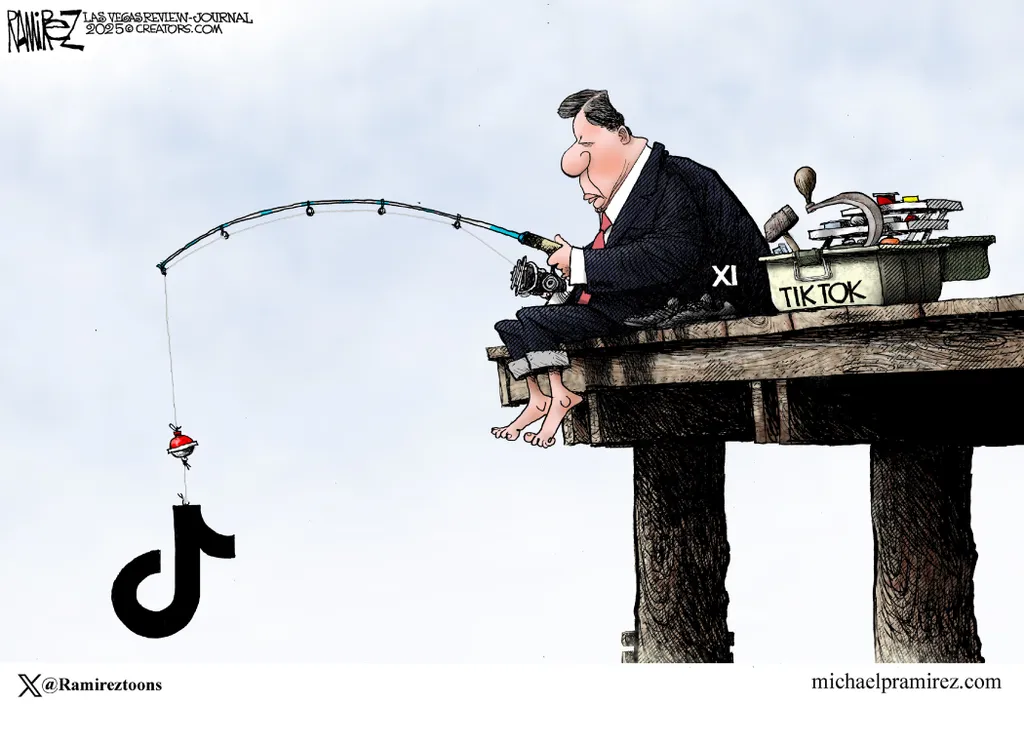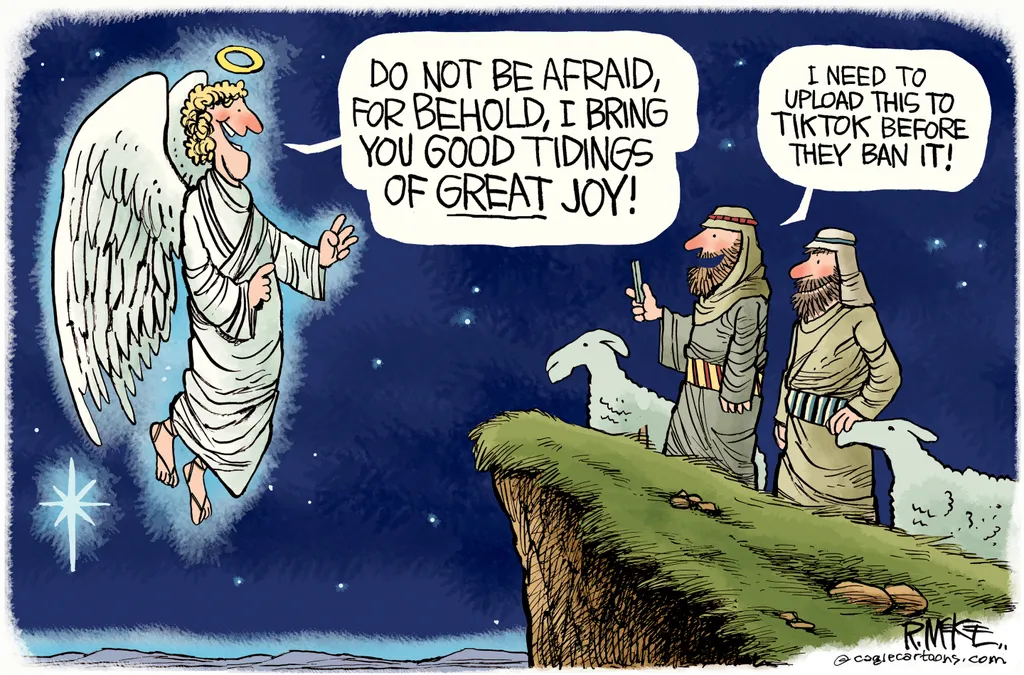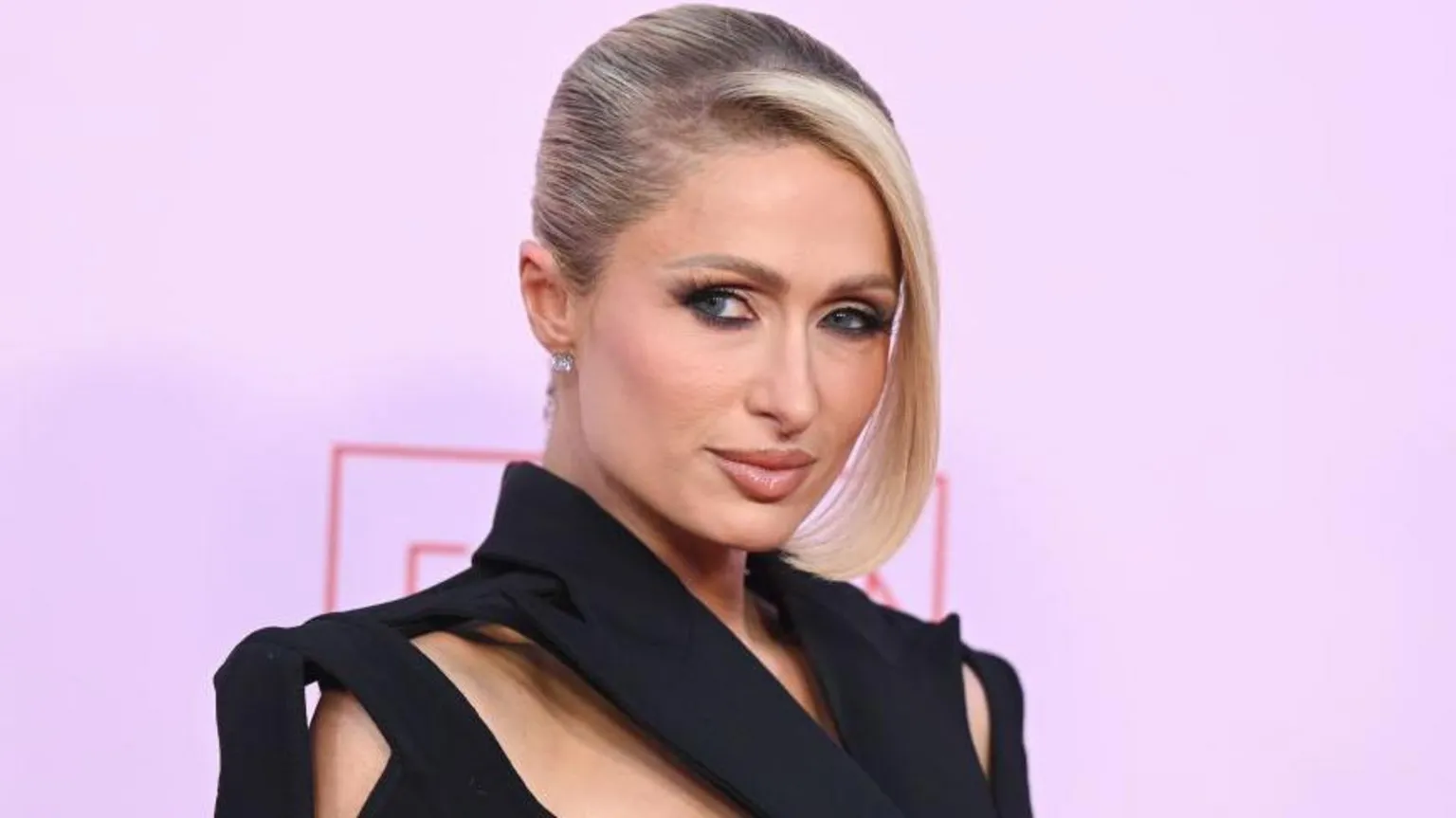Irish court laid down the fine for TikTok’s breach of the EU’s GDPR regulations.The ruling comes as Tiktok's US business remains in limbo. The app was banned in the US over fears surrounding its data security and possible control by Chinese authorities, and will have to find a US buyer to continue operating. Last month Donald Trump signed a second 75-day pause on the ban, as his ongoing trade war with China appears to have delayed efforts to negotiate a sale of the app’s US arm with Chinese owner ByteDance.
The extension comes days after 'Old Donald' announced cumulative tariffs of 54% on China. Prior to the additional tariff rollout on April 2, 'Old Donald'said he could reduce duties on the country to help facilitate a deal for ByteDance to sell its U.S. operations of TikTok.'Maybe I'll give them a little reduction in tariffs or something to get it done,' 'Old Donald' said during a press conference in March. “TikTok is big, but every point in tariffs is worth more than TikTok.”

"We do not want TikTok to 'go dark'," 'Old Donald' wrote on Truth Social. "We look forward to working with TikTok and China to close the Deal." The platform is currently owned by Chinese company ByteDance.Former US President Joe Biden's administration had argued that TikTok could be used by China as a tool for spying and political manipulation.
Sen. Mark R. Warner (D-Virginia), who co-sponsored the 2023 legislation that led to the potential TikTok ban, said in an interview that the "Old Donald" administration’s extension is “clearly against the law.” He was alarmed that the app’s future has become a chip in a broader trade war with China.
Congress passed a bipartisan law last year that gave ByteDance six months to sell its controlling stake in TikTok or see the app blocked in the US.
Opponents of a ban have cited freedom of speech as a reason for keeping the platform open.
The White House had a TikTok deal "Old Donald"’s China tariff wrecked it.
"Old Donald" has said TikTok played a pivotal role in helping him reach young people during the presidential race and celebrated that he is a “big star” there. He has also swatted away criticism, largely from within his own party, that the app represented a national security threat by saying China probably had no interest in spying on “young kids watching crazy videos.”
“The current situation where TikTok is allowed to operate in America, but X is not allowed to operate in China is unbalanced,” Mr. Musk wrote. “Something needs to change.”Senator Rand Paul of Kentucky went as far as joining TikTok as a form of “civil disobedience” on Saturday, urging the app’s fans to take action in a video posted to the platform and to X.
“To the 170 million Americans who use TikTok: Don’t give up, don’t give in,” Mr. Paul said. “Resist.”

Last month, "Old Donald" told reporters that he could extend the deadline again. And while ByteDance hasn’t confirmed any plans to sell, Oracle, the data center company, and others have emerged as potential suitors.
'Old Donald' says a deal is comingTikTok hasn't negotiated with prospective buyers as deadline looms
The April 5 deadline isn't really set in stone.

The intrigue: 'Old Donald' has publicly floated the idea of a U.S. sovereign wealth fund buying TikTok, and Reuters yesterday reported that former Morgan Stanley tech banker Michael Grimes has been tasked with leading a U.S. SWF.
'Old Donald' doesn't seem to believe he needs to abide by the law when it comes to following through on banning TikTok.

'I just spoke to Chairman Xi Jinping of China,' 'Old Donald' posted on Truth Social Friday morning. “The call was a very good one for both China and the U.S.A. Xi and I will do everything possible to make the World more peaceful and safe!”
People should 'stay tune' for his decision. 'It ultimately goes up to me, so you're going to see what I'm going to do,' 'Old Donald' told a reporter on Friday, offering nothing more.
'Old Donald' had asked the Supreme Court to freeze the ban until after he took the White House, saying in a filing that he 'alone possesses the consummate dealmaking expertise ' to negotiate a resolution.'
But the justices, writing in an unsigned order with no dissents, said the 'dramatic' measure was nevertheless necessary to address a societal risk. 'Speaking with and in favor of a foreign adversary is one thing,' they wrote. 'Allowing a foreign adversary to spy on Americans is another.'
Oracle is also facing pressure in Washington to make sure that people who have created TikTok videos can download them and keep them, he said. From a technical perspective, Mr. O’Donnell continued, it means that Oracle would have to create guardrails, allowing people to log in to their personal account and see their own videos but preventing them from viewing other people’s videos.“Conceptually, this is relatively straightforward,” he said.
There are a lot of variables that could change the direction Oracle goes. The Biden administration has said that it won’t enforce the act, so the company could decide not to take action on Sunday, Mr. O’Donnell said. And the 'Old Donald' administration has raised the possibility of exercising a clause in the law that would keep the app running for at least 90 days.
“We’re entering the wild wild West,” Mr. O’Donnell said. “No one has any idea what will happen when 'Old Donald'’s presidency starts.”

What a ban looks like and how it would be enforced remains uncertain. The White House says it will leave enforcement to the 'Old Donald' administration
Justices ruled that the law passed by Congress asking the app's Chinese owner to sell its stake or face a US ban did not violate free speech rights
He will join tech moguls like Mark Zuckerberg and Elon MuskThe 'Old Donald' administration’s embrace of Mr. Chew is significant as the app teeters on the brink of death in the United States.
'Old Donald' has vowed to save the app in the United States once he is inaugurated on Jan. 20, though his options for doing so are limited.
The social media app Xiaohongshu, literally 'Little Red Book' (RedNote), Lemon8, etc. 'RedNote,' has seen a sudden influx in American users as a TikTok ban looms.
American users who call themselves 'TikTok refugees' have signed up to RedNote in droves, making it the most downloaded free app on Apple's app store in the United States over the weekend.
Fear not, all kinds of Chinese media is here to give you shelter, even if it comes with some side of confusion,' a user called 'Everyone loves Yu Qing' said in an English-language guide for app newbies struggling with the 'culture shock' of joining a made-for-China app.
RedNote Gains Traffic Ahead Of TikTok Ban — But Sparks Consent And Control Concerns
Russia fined TikTok for not removing prohibited content. The results of a presidential election in Romania were thrown out over concerns the app had been used to spread foreign influence.“Either TikTok protects the children of Albania, or Albania will protect its children from TikTok,” the prime minister, Edi Rama, said on X.
TikTok’s novelty comes from its proprietary algorithm, which recommends a constant stream of content, mostly short videos, calibrated to keep people scrolling.
Taiwan banned the app from government devices in 2019. But officials say they aren’t contemplating a wholesale ban because they do not want to curb Taiwan’s culture of public debate. Britain, Australia and France, as well as the executive arm of the European Unionand New Zealand’s Parliament, have adopted the same approach.TikTok was already banned from government-issued mobile devices in Canada when the government directed TikTok to close its offices in the country in November, citing national security risks posed by ByteDance.
With over 170 million American users, the US Justice Department has said the app poses "a national security threat of immense depth and scale" because of its Chinese parent company and access to US users' data.

Mental health content on TikTok had the lowest misinformation rate at 31%. Wellness and self-care videos were slightly worse at 37%, while advice about chronic illness was false or misleading 39% of the time. More views also doesn’t equate to more reliable information—videos with more than 5 million views were found to be 14% more likely to spread false information than those with fewer than 1 million views.With 17% of Americans trusting TikTok as much as they do doctors, and 7% trusting the platform even more than they do medical professionals, the consequences are potentially serious. Given that nearly half of U.S. TikTok users are under 30, the app becomes a perfect storm for misleading advice targeting a young and impressionable audience. There’s also no easy way to verify whether these so-called experts have the credentials they claim, leaving users to rely on unvetted information.
Romanian presidential candidate Calin Georgescu has millions of likes on TikTok and hundreds of thousands of followers. He ran a successful social media campaign to emerge victorious in the first round of the country's presidential elections."We have now a TikTok messiah or something like that. Very successful. And we are ot sure if he will be able to win in the second round."
Attorneys general from 13 states and the District of Columbia are alleging in a series of lawsuits that TikTok violated local consumer protection laws by designing its wildly popular video-sharing app in ways that lead to compulsive use, exposing young users to mental and physical risk. And they claim the company, which is owned by China-based tech giant ByteDance, has misled the public about how safe its platform is for children.While it is unclear when the appeals court will make its decision, the two sides have requested an expedited ruling by December, to allow time for a potential appeal to be filed with the Supreme Court before the sale-or-ban deadline of Jan. 19.
“It was incumbent upon us to bring action now to stop dangerous behavior from happening as soon as possible,” Schwalb said.
The suit, which was joined by the Federal Trade Commission, said it was aimed at putting an end "to TikTok's unlawful massive-scale invasions of children's privacy."
The search tool would have allowed ByteDance and TikTok employees 'to collect bulk user information based on the user's content or expressions, including views on gun control, abortion, and religion,' a DOJ official said. The filing did not indicate how or if the data was used.Social media companies, like Meta's Facebook, also ask users to share their religion and other personal information. However the DOJ alleges that TikTok's access to sensitive information could cause geopolitical risks, by allowing the Chinese government to demand ByteDance share U.S. users' data.
DOJ officials also argued against TikTok's First Amendment defense, saying any damage from the law to users' speech freedoms would be 'incidental.'

'Any adverse effects on expression by U.S. persons are indirect and amply justified,' officials said. TikTok creators, they added later, 'have no First Amendment right to TikTok.'

Like everyone else here, TikTok wanted to show off its new AI products . At a press conference, a top executive from its parent company, ByteDance, rolled out a fascinating and unsettling new feature that allows users to create realistic AI avatars that can say and do… pretty much anything in any language.
TikTok said the account of reality TV star Paris Hilton was also targeted, but it was not compromised.Ms Hilton, who has more than 10 million followers on TikTok, is an active user of the platform.

Earlier this month, 'Old Donald' joined TikTok, despite attempting to ban it on national security grounds during his presidency.
Here in Taiwan, lawmakers say, they do not have the luxury of thinking of TikTok as the only threat. Disinformation reaches Taiwanese internet users on every type of social media, from chat rooms to short videos.

But the most widely used platforms have foreign owners, and TikTok is not the only one. YouTube, Facebook and Instagram, operated by publicly traded U.S. companies, are even more popular than TikTok in Taiwan. And Line, a messaging app owned by a Japanese subsidiary of the South Korean internet giant Naver, is commonly used in the country as a news source and way to make payments.
When Taiwan went to the polls in January, multiple organizations and government agencies were on call to make sure the conversation on TikTok stuck to the facts. When Taiwan went to the polls in January, multiple organizations and government agencies were on call to make sure the conversation on TikTok stuck to the facts.
But some worry that this made it easier for pro-China views to spread on TikTok, and that Taiwan’s approach to regulating social media is not robust enough to confront the persistent threat of foreign influence online.
'In the U.S., the target is very clear ' this one platform - but in Taiwan, we don't know where the enemy is,' Ms. Chiu said. 'It's not just a cross-strait issue, but a domestic one.'
